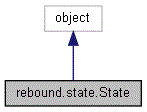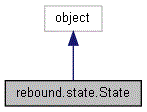 |
BamBirds 2021
|
 |
BamBirds 2021
|


Public Member Functions | |
| def | __init__ (self, turn, prev, tuple coords, int entry_edge, int mt, list theta_range, float velocity, no_gravity=False) |
| def | next_states (self, pixels, shuffle=True) |
| def | next_state (self, int exit_edge, pixels) |
| def | bounce (self, start_angles, int bounce_edge, wall_angle) |
| def | on_line (self) |
| def | next_pixel (self, int i) |
| def | free (self, pixels, i=None) |
| def | hits_target (self, pixels, i=None) |
| np.ndarray | point_angle (self, pixels, i=None) |
| def | apply_gravity (self, tuple new_coords, int entry_edge, list possible_angle_range) |
| def | on_parabola (self, list angles, float velocity) |
| def | __str__ (self) |
| def | __eq__ (self, value) |
| def | show (self) |
| def | plot_points (self, plotter) |
| def | show_on_image (self, img, color_prev=(None, None, 255), color_to_show=(None, None, 100), image_name="tmp.png") |
| def | path_length (self) |
| def | better_path_length (self) |
| def | actual_path_length (self) |
| def | better_actual_path_length (self) |
| def | start_angle_range (self) |
| def | first_turn (self) |
| def | origin (self) |
Public Attributes | |
| turn | |
| prev | |
| coords | |
| entry_edge | |
| mt | |
| theta_range | |
| velocity | |
| no_gravity | |
Defines a state in the simulation
Arguments:
turn {State} -- Last State where the direction changed because of a bounce.
prev {State} -- Previous State
coords {tuple} -- coordinates of the state
entry_edge {int} -- edge on which the current zone was entered
mt {int} -- Movement Type. One of settings.[FLY|BOUNCE|SLIDE]
theta_range {list} -- Angle interval at turn to reach this state
velocity {float} -- velocity at turn
Keyword Arguments:
no_gravity {bool} -- if no gravity, angle, rebound calculations should be executed (default: {False})
Raises:
TypeError: invalid type for coords, entry_edge or mt
| def rebound.state.State.actual_path_length | ( | self | ) |
Path length that is more accurate to the acutal path. uses the distance between edges
Returns:
float -- length of the path
| def rebound.state.State.apply_gravity | ( | self, | |
| tuple | new_coords, | ||
| int | entry_edge, | ||
| list | possible_angle_range | ||
| ) |
Apply gravity to the current angle for the new state
Arguments:
new_coords {tuple} -- Coordinates of the new zone
entry_edge {int} -- entry edge into the new zone
possible_angle_range {[type]} -- Possible angle range for the transition over entry edge
Raises:
ArithmeticError: if there are no possible new angles
Returns:
tuple -- (new starting angle interval, current angle interval in the new zone)
| def rebound.state.State.better_actual_path_length | ( | self | ) |
Combination of parabola path length and actual path length if no_gravity is true
Returns:
float -- length of the path
| def rebound.state.State.better_path_length | ( | self | ) |
Path length for parabolas. Calculates the distance between turn points
Returns:
float -- length of the path
| def rebound.state.State.bounce | ( | self, | |
| start_angles, | |||
| int | bounce_edge, | ||
| wall_angle | |||
| ) |
bounce and calculate the angles after a bounce
Arguments:
start_angles {sequence} -- starting angles at turn
bounce_edge {int} -- edge of the bounce
wall_angle {np.ndarray} -- normal for the wall
Returns:
list -- new angle interval after the bounce
| def rebound.state.State.first_turn | ( | self | ) |
Return the first turn point
Returns:
State -- first turn point
| def rebound.state.State.free | ( | self, | |
| pixels, | |||
i = None |
|||
| ) |
Calculate if the current or next zone is only filled with ABType.Background
Arguments:
pixels {numpy.ndarray} -- level representation
Keyword Arguments:
i {int} -- if set the zone at the exit edge i is checked (default: {None})
Returns:
bool -- if the zone is free
| def rebound.state.State.hits_target | ( | self, | |
| pixels, | |||
i = None |
|||
| ) |
Calculate if the corrent or next zone contains hits the target
Arguments:
pixels {numpy.ndarray} -- level representation
Keyword Arguments:
i {int} -- if set the zone at the exit edge i is checked (default: {None})
Returns:
bool -- if the zone hits the target
| def rebound.state.State.next_pixel | ( | self, | |
| int | i | ||
| ) |
Calculate the coordinates of the next pixel at exit edge i
Arguments:
i {int} -- exit edge
Returns:
tuple -- coordinates of the next pixel
| def rebound.state.State.next_state | ( | self, | |
| int | exit_edge, | ||
| pixels | |||
| ) |
Calculate the a next state
Arguments:
exit_edge {int} -- edge to exit the current zone
pixels {numpy.ndarray} -- matrix for representation
Returns:
State -- the new state in the zon of exit edge
| def rebound.state.State.on_parabola | ( | self, | |
| list | angles, | ||
| float | velocity | ||
| ) |
Calculate if the previous state are on the parabola
Arguments:
angles {list} -- starting angles to test
velocity {float} -- starting velocity
Returns:
bool -- if the previous states are on the parabola
| def rebound.state.State.origin | ( | self | ) |
Return the origin of the simulation
Returns:
State -- origin state
| def rebound.state.State.path_length | ( | self | ) |
Primitive path length of the state history. Only considers number of states
Returns:
int -- length of the path
| def rebound.state.State.plot_points | ( | self, | |
| plotter | |||
| ) |
Plot previous state history as points to plotter
Arguments:
plotter {axis or matplotlib} -- Where to plot the points to
| np.ndarray rebound.state.State.point_angle | ( | self, | |
| pixels, | |||
i = None |
|||
| ) |
Calculate the angle of the wall in
Arguments:
pixels {numpy.ndarray} -- level representation
Keyword Arguments:
i {int} -- if set the zone at the exit edge i is checked (default: {None})
Raises:
ValueError: if there is no object edge in the zone
Returns:
np.ndarray -- the normal of the edge at the specified zone
| def rebound.state.State.show | ( | self | ) |
Show the State and its previous states in a matplotlib window will not be executed if settings.image_debug is false
| def rebound.state.State.show_on_image | ( | self, | |
| img, | |||
color_prev = (None,None,255), |
|||
color_to_show = (None,None,100), |
|||
image_name = "tmp.png" |
|||
| ) |
Reveal the state history on an image
Arguments:
img {Image} -- Image to draw the state history to
Keyword Arguments:
color_prev {tuple} -- color to restore at the respective pixels (default: {(None,None,255)})
color_to_show {tuple} -- color to print at the pixels (default: {(None,None,100)})
image_name {str} -- file to save the image to if settings.save_images is true (default: {"tmp.png"})
| def rebound.state.State.start_angle_range | ( | self | ) |
Return the angle interval before the last turn point
Returns:
list -- angle interval